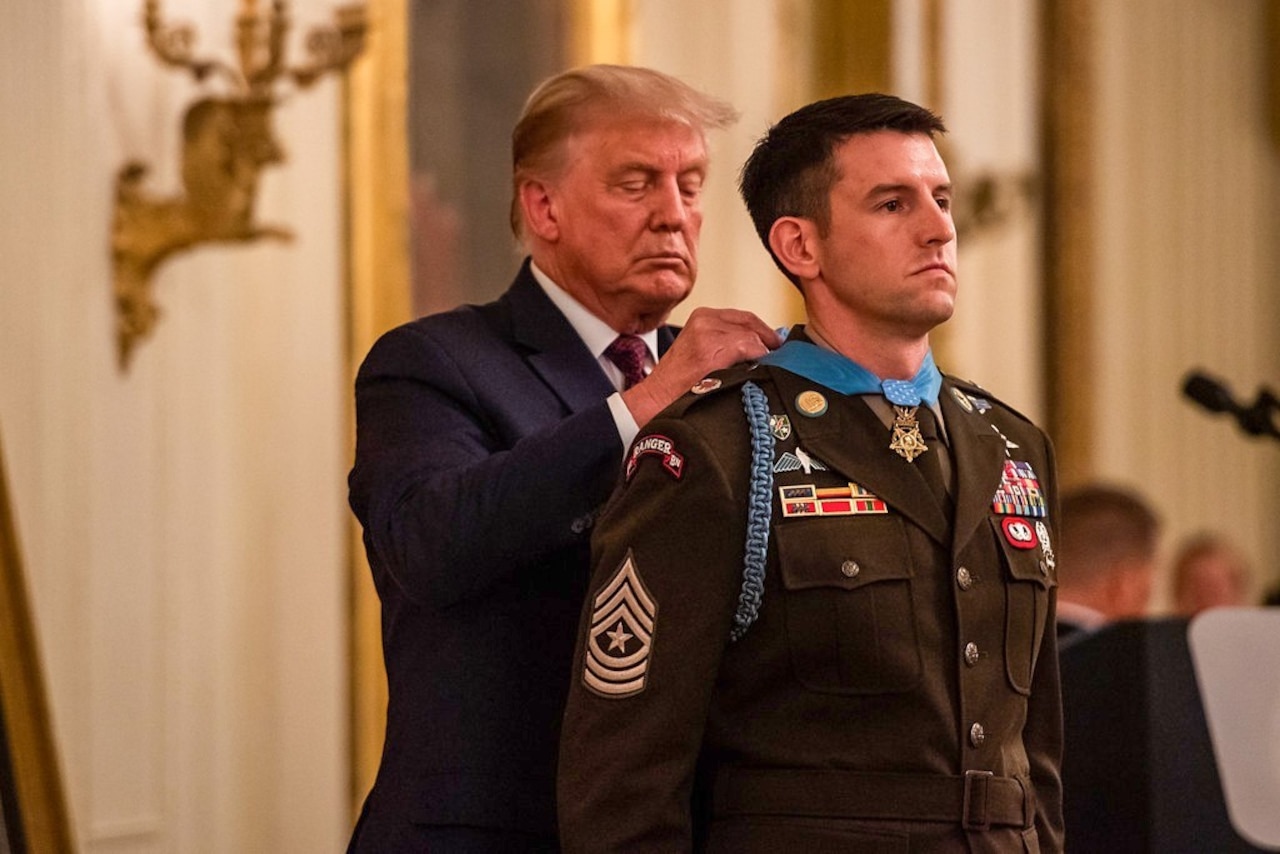President Awards Medal of Honor to Army Ranger for Hostage Rescue
Army Sgt. Maj. Thomas “Patrick” Payne received the Medal of Honor at a White House ceremony today for helping liberate over 70 hostages from an ISIS prison compound in Iraq five years ago.
President Donald Trump draped the nation’s highest military award around Payne’s neck during a ceremony on the anniversary of the Sept. 11 terrorist attacks — a day that compelled Payne to enlist.
As news of the attacks spread throughout the world, Payne sat in his high school classroom listening to his teacher.
“His teacher solemnly told the students that their generation had a fight to win,” President Donald Trump said. “In that moment, Pat was called to action. He knew that his country needed him.”
Ten months later, Payne, of Batesburg-Leesville and Lugoff, South Carolina, shipped off to basic training. Since then, he has deployed 17 times to combat zones as a member of the 75th Ranger Regiment and in various positions with the U.S. Army Special Operations Command.
In 2010, he was wounded by a grenade blast in Afghanistan, but later recovered and went on to win the Army’s Best Ranger Competition in 2012.
It was one of the largest and most daring rescue missions in American history.”
President Donald Trump
While deployed again, Payne was part of a joint task force that assisted Iraqi security forces in raiding the ISIS prison near Hawija in northern Iraq on Oct. 22, 2015.
“The team soon received horrifying intelligence that the terrorists were planning to massacre their captives and bury them in freshly-dug graves,” Trump said. “Pat and his teammates raced into action.”
During the nighttime operation, Payne, now 36, risked his life amid heavy enemy gunfire and suicide-vest detonations to save the hostages, many of whom were captured members of Iraqi security forces.
After being infilled by CH-47 Chinook helicopters, Payne and members of the task force climbed over a wall into the prison compound. Payne, an assistant team leader at the time, helped lead his team as it cleared one of the two buildings known to house hostages.
Once inside the building after light resistance from the enemy, Payne’s team used bolt cutters to pierce through the locks of a prison door, freeing nearly 40 hostages.
Payne and others then heard an urgent call for help over the radio from other task force members engaged in an intense firefight at the second building.
“Pat turned to one of his fellow Soldiers and said, ‘let’s get into the fight,'” Trump said.
Payne and his team maneuvered about 30 yards to the heavily-fortified building, which was partially on fire.
Once there, he and others scaled a ladder onto the roof of the one-story building as a sustained rate of enemy machine-gun fire shot out from below. From a vantage point on the roof, they engaged the enemy with hand grenades and small arms fire.
At that point, enemy fighters began to detonate their suicide vests, causing the roof to shake. Payne and others then moved off the roof to an initial breach point on the ground level.
“Pat and his fellow Rangers fought through the fire, the bullets and the deadly blasts,” Trump said.
Today, he joins the immortal company of our most revered American heroes.”
With barricaded enemies firing rounds toward him, Payne entered the structure to open another fortified door. After he managed to cut the first lock, he had to run out due to the heavy smoke and handed off the bolt cutters to an Iraqi partner. After the partner came out for fresh air, Payne took the tool again to sheer off the last lock and kick open the door.
“He ran right back into that raging blaze,” Trump said. “He sliced the final lock and released the rest of the hostages as the building began to collapse.”
Still being engaged by the enemy, Payne and others escorted about 30 more hostages out of the burning building.
With disregard for his own safety, Payne then reentered the building two more times to ensure every hostage was out. One of those times he had to forcibly remove one of the hostages who had been too frightened to move during the chaotic scene.
“He was the last man to leave,” Trump said. “He wouldn’t leave, no matter what they said, no matter who ordered him to do it. He was the last one out.
“It was one of the largest and most daring rescue missions in American history,” he added. “You truly went above and beyond the call of duty.”
The mission left one U.S. Soldier, Master Sgt. Josh Wheeler, and at least 20 insurgents dead.
“Pat would be the first to remind us that he was not alone that day,” Trump said.
The president then honored Wheeler’s wife, Ashley, who was in attendance.
“Our nation endures because fearless warriors, like Josh, are willing to lay down their lives for our freedom,” Trump said. “Our children can grow up in peace because Josh had the courage to face down evil. Our debt to him and to you is everlasting.”
For his actions that day, Payne was initially awarded the Army’s second-highest award, the Distinguished Service Cross, which was later upgraded to a Medal of Honor.
Payne currently serves as an instructor at the U.S. Army Special Operations Command where he trains “the next generation of American warriors,” Trump said.
“Today, he joins the immortal company of our most revered American heroes,” he said. “Pat, you personify the motto, ‘Rangers lead the way,’ and you inspire us all.”


